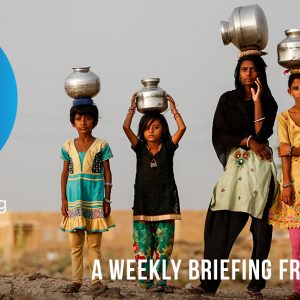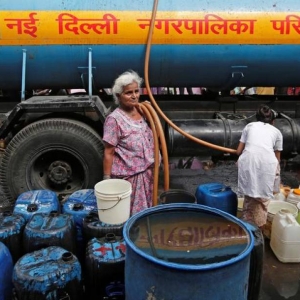The Stream, July 16, 2019: Millions Evacuate as Monsoon Flooding Swamps India, Nepal, and Bangladesh
The Global Rundown
Torrential monsoon rains displace more than four million people across India, Nepal, and Bangladesh. Tropical Depression Barry skirts New Orleans but still brings flooding to the U.S. Gulf Coast. Warmer weather in the U.S. intensifies summertime drought, a study finds. Drought and water pollution cause taps to run dry in Zimbabwe’s capital. The Eabametoong First Nation in Ontario, Canada, declares a state of emergency over tainted drinking water.
“The discovery of high levels of trihalomethanes, combined with and ongoing issues with our water and wastewater systems, has forced us to declare a State of Emergency to protect the health of our community.” –Harvey Yesno, Chief of the Eabametoong First Nation, in reference to water pollution in the northern Ontario community. Eabametoong has been under a boil water advisory for 18 years, and is now grappling with elevated levels of trihalomethanes (THMs), which have been tied to cancer and reproductive health issues. The First Nation is calling for immediate action from the Canadian government. APTN National News
Latest WaterNews from Circle of Blue
HotSpots H2O: Rohingya Refugee Camp Overwhelmed by 23-Inch Monsoon — For the past two weeks, deadly monsoon rains have deluged the Rohingya refugee camps in Bangladesh, wiping away vulnerable shanties and forcing thousands to relocate.
What’s Up With Water– July 15, 2019 — This week’s edition of What’s Up With Water includes coverage on massevacuations in China due to extreme rainfall, U.S. President Donald Trump’s threat to veto a PFAS-related bill, and the ongoing water crisis in Chennai, India.
By The Numbers
4.3 million People displaced from the Indian state of Assam in the last two weeks due to monsoon flooding. Thousands of others have been forced from their homes in Nepal, Bangladesh, and other parts of India. The torrential rains have left more than 100 people dead, including 64 in Nepal. Reuters
2 million+ Residents of Harare, Zimbabwe, who are currently without a municipal water supply as drought and water pollution jeopardize clean water access. Two of the capital city’s four dams are dry, and much of Harare’s remaining water supply is tainted by sewage and industrial waste. Yale Environment 360
Science, Studies, and Reports
A warming climate is escalating drought risk in areas of the United States with low soil moisture, such as the southern plains and southwestern U.S., says a new study by the University of Arkansas. Researchers found that higher temperatures in low-moisture areas produced a “coupling” of land and atmosphere, which then intensified the severity of summertime drought. Science Daily
On the Radar
New Orleans avoided a direct hit by Tropical Depression Barry, but the slow-moving storm still brought flooding, power outages, and a tornado threat to parts of the U.S. Gulf Coast. Heavy rainfall from the storm is expected to continue through Monday. Associated Press

Kayla Ritter is a recent graduate of Michigan State University, where she studied International Relations and Teaching English to Speakers of Other Languages. She is currently based in Manton, Michigan. Kayla enjoys running, writing, and traveling. Contact Kayla Ritter






Leave a Reply
Want to join the discussion?Feel free to contribute!